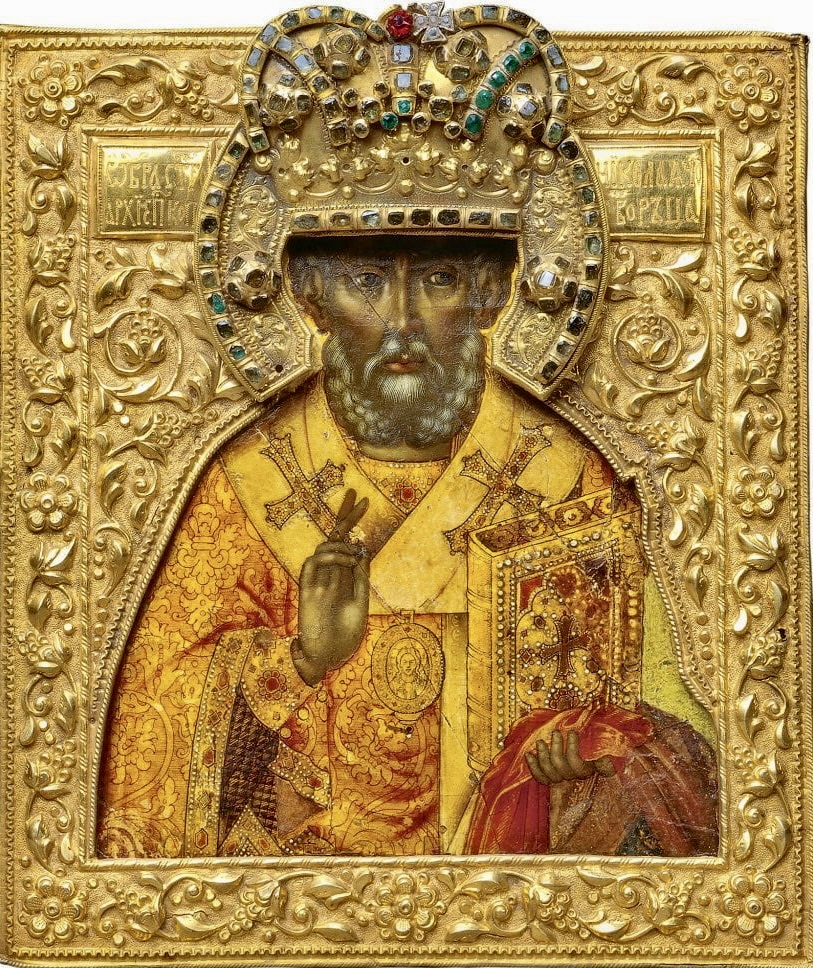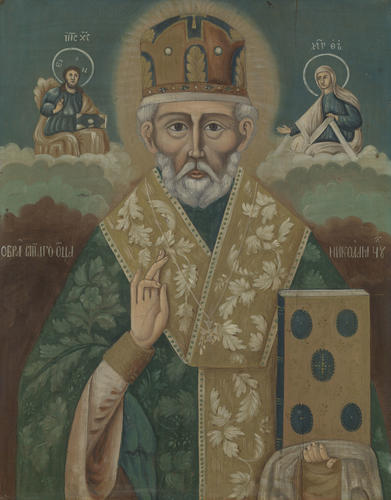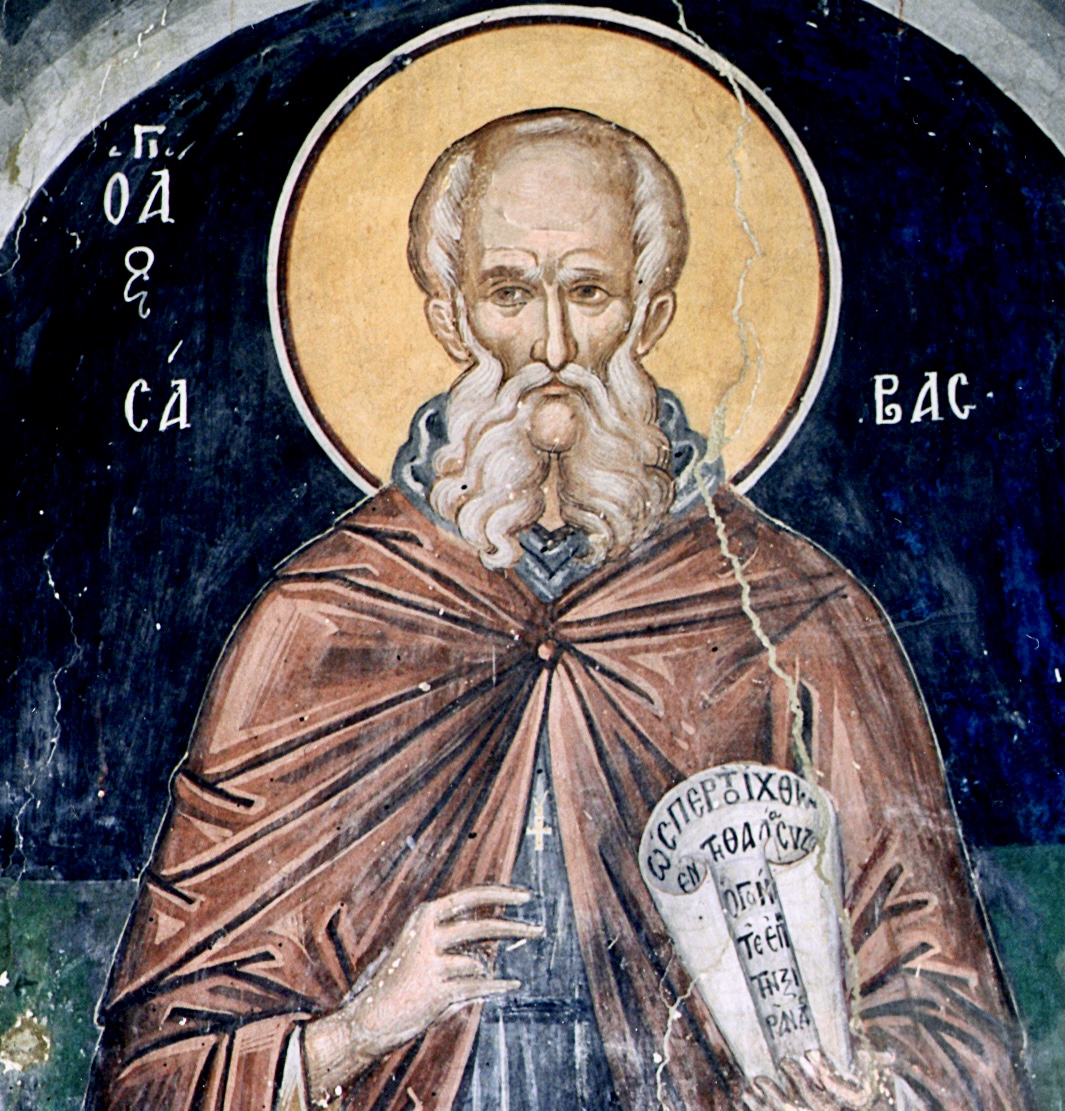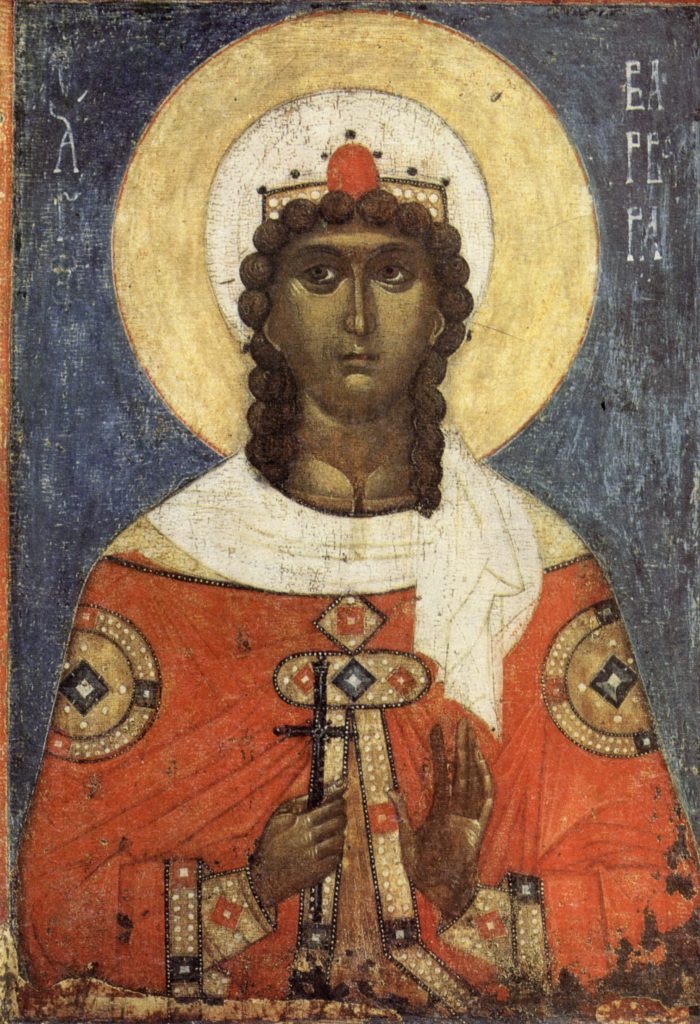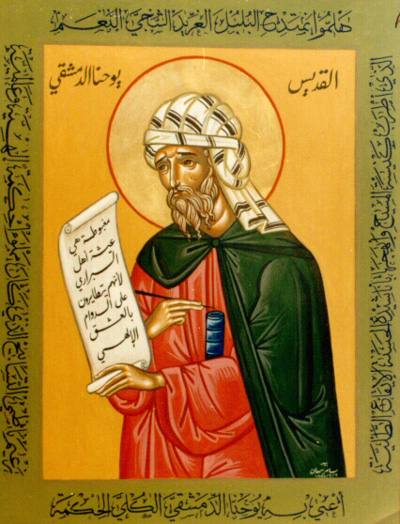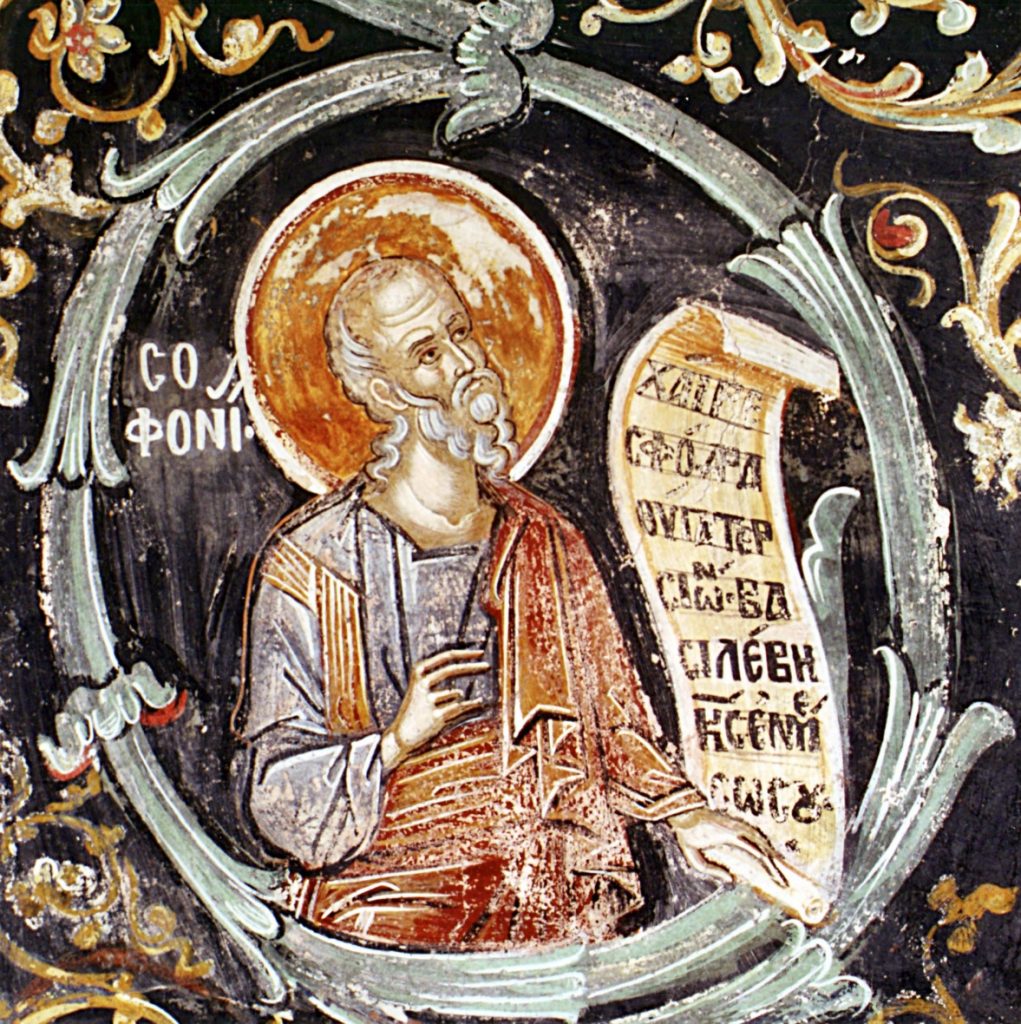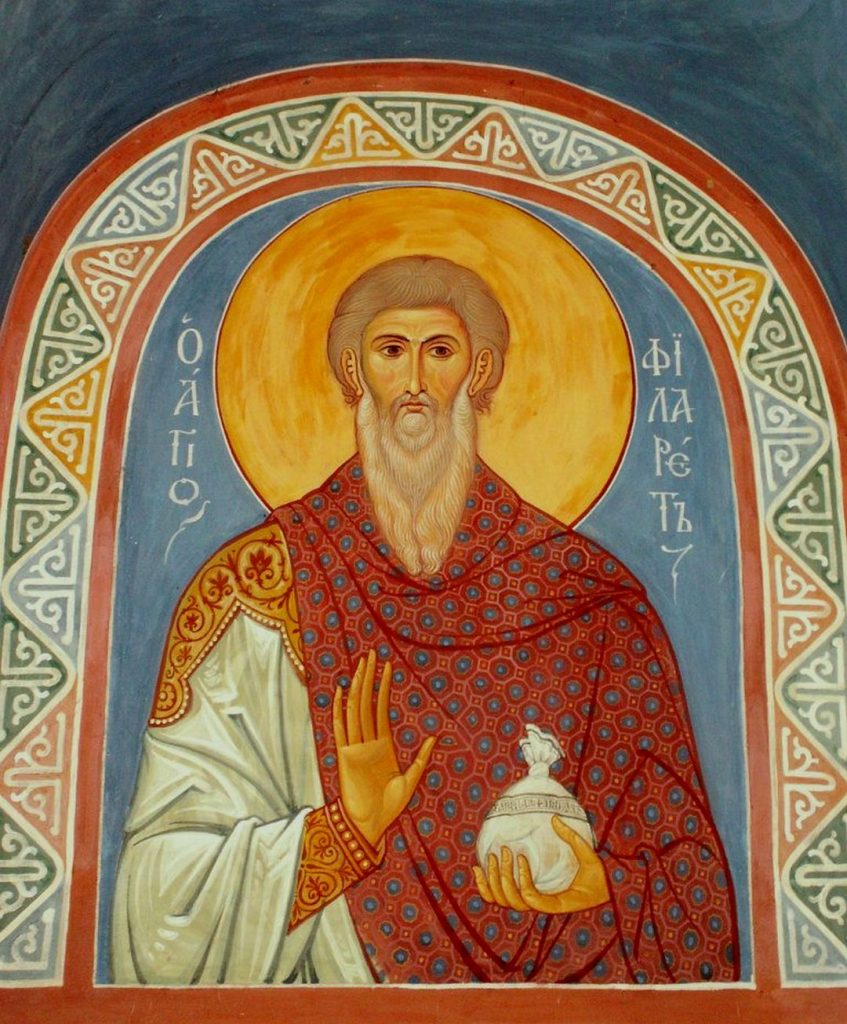7/20 December
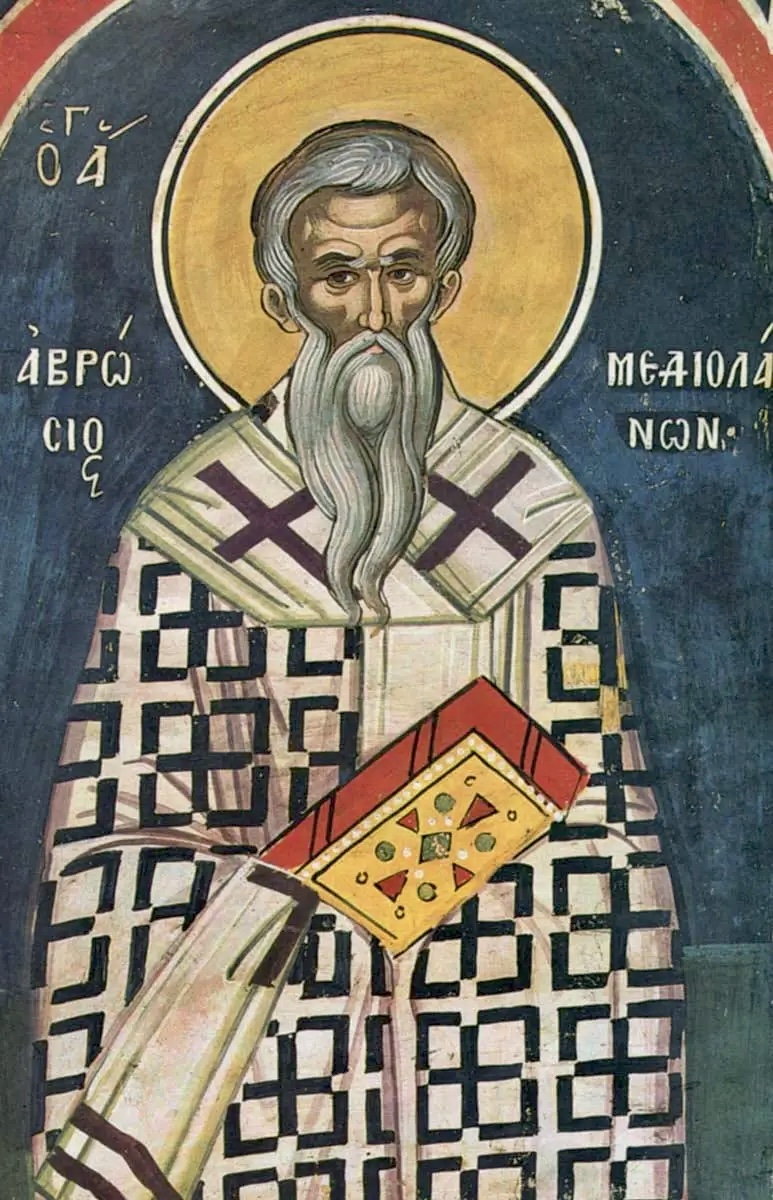
Saint Ambrose, Bishop of Milan, was born in the year 340 into the family of the Roman prefect of Gaul (now France). Even in the saint’s childhood there appeared presentiments of his great future. Once, bees covered the face of the sleeping infant. They flew in and out of his mouth, leaving honey on his tongue. Soon they flew away so high that they could no longer be seen. Ambrose’s father said that the child would become something great when he reached manhood.
After the death of the father of the family, Ambrose journeyed to Rome, where the future saint and his brother Satyrius received an excellent education. About the year 370, upon completion of his course of study, Ambrose was appointed to the position of governor (consular prefect) of the districts of Liguria and Aemilia, though he continued to live at Mediolanum (now Milan).
In the year 374 Auxentius, the Arian Bishop of Mediolanum, died. This led to complications between the Orthodox and the Arians, since each side wanted to have its own bishop. Ambrose, as the chief city official, went to the church to resolve the dispute.
While he was speaking to the crowd, suddenly a child cried out, “Ambrose for bishop!” The people took up this chant. Ambrose, who at this time was still a catechumen, considered himself unworthy, and tried to refuse. He disparaged himself, and even tried to flee from Mediolanum. The matter went ultimately before the emperor Valentinian the Elder (364-375), whose orders Ambrose dared not disobey. He accepted holy Baptism from an Orthodox priest and, passing through all the ranks of the Church clergy in just seven days, on December 7, 374 he was consecrated Bishop of Mediolanum. He dispersed all his possessions, money and property for the adornment of churches, the upkeep of orphans and the poor, and he devoted himself to a strict ascetic life.
Ambrose combined strict temperance, intense vigilance and work within the fulfilling of his duties as archpastor. Saint Ambrose, defending the unity of the Church, energetically opposed the spread of heresy. Thus, in the year 379 he travelled off to establish an Orthodox bishop at Sirmium, and in 385-386 he refused to hand over the basilica of Mediolanum to the Arians.
The preaching of Saint Ambrose in defence of Orthodoxy was deeply influential. Another noted Father of the Western Church, Saint Augustine (June 15), bore witness to this, having accepted holy Baptism in the year 387 by the grace of the preaching of the bishop of Mediolanum.
Saint Ambrose also actively participated in civil matters. Thus, the emperor Gracian (375-383), having received from him the “Exposition of the Orthodox Faith” (De Fide), removed, by decree of the saint, the altar of Victory from the halls of the Senate at Rome, on which oaths were wont to be taken. Displaying a pastoral boldness, Saint Ambrose placed a severe penance on the emperor Theodosius I (379-395) for the massacre of innocent inhabitants of Thessalonica. For him there was no difference between emperor and commoner. Though he released Theodosius from the penance, the saint would not permit the emperor to commune at the altar, but compelled him to do public penance.
The fame of Bishop Ambrose and his actions attracted to him many followers from other lands. From far away Persia learned men came to him to ask him questions and absorb his wisdom. Fritigelda (Frigitil), queen of the military Germanic tribe of the Markomanni, which often had attacked Mediolanum, asked the saint to instruct her in the Christian Faith. The saint in his letter to her persuasively stated the dogmas of the Church. And having become a believer, the queen converted her own husband to Christianity and persuaded him to conclude a treaty of peace with the Roman Empire.
The saint combined strictness with an uncommon kindliness. Granted a gift of wonderworking, he healed many from sickness. One time at Florence, while staying at the house of Decentus, he resurrected a dead boy.
The repose of Saint Ambrose, who departed to the Lord on the night of Holy Pascha, was accompanied by many miracles. He even appeared in a vision to the children being baptized that night. The saint was buried in the Ambrosian Basilica in Mediolanum, beneath the altar, between the Martyrs Protasius and Gervasius (October 14).
A zealous preacher and valiant defender of the Christian Faith, Saint Ambrose received particular renown as a Church writer. In dogmatic compositions he set forth the Orthodox teaching about the Holy Trinity, the Sacraments, and Repentance: “Five Books on the Faith” (De Fide); “Explication of the Symbol of the Faith” (Explanatio Symboli); “On the Incarnation” (De Incarnationis); “Three Books on the Holy Spirit” (De Spiritu Sancto); “On the Sacraments” (De Sacramento); “Two Books on Repentance” (De Paenitentia). In writings about Christian morality, he explained the excellence of Christian moral teaching compared to pagan moral teaching.
A well-known work of Saint Ambrose, “On the Duties of the Clergy” (De Officiis Ministrorum) evidences his deep awareness of pastoral duty. He stresses that those who serve in the Church should have not only the proper knowledge of Church services, but also the proper knowledge of moral precepts.
Saint Ambrose was also a reformer of Church singing. He introduced antiphonal singing (along the Eastern or Syrian form) into the Western Church, which became known as “Ambrosian Chant.” He also composed twelve hymns which were used during his lifetime. The hymn, “Thee, O God, we praise” (Te Deum), attributed to Saint Ambrose, entered into the divine services of the Orthodox Church (Moleben).

The canon to the saint, the acrostic whereof is: “I praise Ambrose most great,“ in Tone IV.
Ode I, Irmos: Through the deep of the Red Sea, * marched dry-shod Israel of old, * and by Moses’ outstretched hands, * raised in the form of a cross, * the power of Amalek was routed in the wilderness.
Hierarch of Christ, Ambrose, pray to God for us!
O venerable one, radiant with divine splendours, by thy prayers illumine those who piously honour thy radiant, light-bearing and holy repose.
Hierarch of Christ, Ambrose, pray to God for us!
The Word of God gave thee the discourse of wisdom adorned with true knowledge, O hierarch Ambrose, dispelling the irrational and malicious thought of the heretics.
Hierarch of Christ, Ambrose, pray to God for us!
Having cleansed the vision of thy mind of the darkness of the passions, O thou
that art most noetically rich, thou didst render it receptive to the pure effulgence of the most holy Spirit, O all-blessed one.
Glory be to the Father, and to the Son, and to the Holy Spirit.
Having by thine all-wise and sacred dogmas, as a pastor fended off the destruction of those who were of like mind with Arius, O all-wise one, with faith thou didst shepherd thy rational sheep in the meadows of Orthodoxy.
Now and ever, and unto the ages of ages. Amen.
By the Father’s will and through the divine Spirit of God, thou didst, seedlessly conceive and give birth in the flesh unto the Son Who, for our sake, was begotten of the Father without mother and was born of thee without father.
Ode III, Irmos: Not in wisdom, nor in power do we glory, * but we glory in Thee O Christ, * the Hypostatic Wisdom of the Father, * for there is none more holy than Thee, O Lover of mankind.
Hierarch of Christ, Ambrose, pray to God for us!
Having received of God an abundance of grace and power, O father Ambrose, by thy tangible touch thou didst heal the divers passions of those who had recourse to thee.
Hierarch of Christ, Ambrose, pray to God for us!
O venerable one, having learned all the knowledge of the Scriptures, in that thou wast a godly hierarch, thou didst manifestly make plain to the ignorant things difficult to understand, O father Ambrose.
Glory be to the Father, and to the Son, and to the Holy Spirit.
With the sentence of God thou didst instantly strike dead the vile woman who
audaciously and senselessly strove to draw nigh unto thee, who didst shine forth with spiritual wisdom.
Now and ever, and unto the ages of ages. Amen.
Thou alone hast renewed the human race, having given birth unto the Creator and Lord of our nature. Wherefore, we glorify thee, O divinely joyous one.
Lord, have mercy. Lord, have mercy. Lord, have mercy.
Sessional Hymn, Tone VIII, Spec. Mel. “Of the Wisdom…”: Zealously emulating Elijah the Prophet, and likewise John the Baptist, thou didst manfully denounce the iniquitous emperor, O hierarch; in a godly manner adorning thy see, and enriching the world with a multitude of miracles. Wherefore, learned in the divine Scriptures, thou didst establish the faithful therein, and convert the unbelieving. O hierarch Ambrose, entreat Christ God, that He grant remission of transgressions unto those who, with love, celebrate thy holy memory.
Glory be to the Father, and to the Son, and to the Holy Spirit; now and ever, and unto the ages of ages. Amen.
Theotokion, Tone VIII: Having fallen with wicked thoughts, * I have sunk into the abyss of sin, * and, groaning, I cry to thee with all my heart, O all-pure one: * Show forth upon me the wonder of thy rich mercy, * the unfathomable depth of thy tender compassion * and the immeasurable wealth of thy compassions, * and grant me repentance and forgiveness of transgressions, * that I may cry unto thee with love: * Entreat Christ
God, that He grant remission of sins unto me, ** for thee do I, thy servant, have as my hope.
Stavrotheotokion (replaces the Theotokion on Wednesdays and Fridays): Beholding the Lamb, Shepherd and Deliverer upon the Cross, the Ewe-lamb cried out, weeping, and exclaimed, bitterly lamenting: The world rejoiceth, receiving deliverance through Thee, but my womb doth burn, beholding Thy crucifixion, which Thou dost endure in the loving-kindness of Thy mercy, O long-suffering Lord, Abyss of mercy and inexhaustible Wellspring! Take pity, and grant remission of offences unto those who, with faith, hymn Thy divine sufferings.
Ode IV, Irmos: For the sake of love for Thine image, * O compassionate One, * Thou didst ascend the cross * and the nations melted away. * For Thou, O Lover of mankind, * art my strength and my praise.
Hierarch of Christ, Ambrose, pray to God for us!
Having been anointed with the chrism of the priesthood, thou wast shown forth as a hierarch, ordaining priests and granting the cleansing of salvation unto all.
Hierarch of Christ, Ambrose, pray to God for us!
Thou didst protect thy flock from all the harm of the adversaries, O blessed one, and didst blind the delusion of Arius with the radiance of thy words.
Glory be to the Father, and to the Son, and to the Holy Spirit.
Invested with the power of the Spirit, thou didst dispel the evil spirits of malice, who could not endure thy rebuke, O all-blessed one.
Now and ever, and unto the ages of ages. Amen.
He that wrought all things by His will is Himself wrought of thy pure blood, saving those who acknowledge thee to be the pure Mother of God.
Ode V, Irmos: Thou, O Lord, who didst come into the world, * art my light, * a holy light turning from the darkness of ignorance * those who sing Thy praises in faith.
Hierarch of Christ, Ambrose, pray to God for us!
Having attained a mind resplendent with immaterial light, O blessed Ambrose, thou hast emitted rays of healing and miracles.
Hierarch of Christ, Ambrose, pray to God for us!
Thou didst raise thyself up as a sacred dwelling place of the Spirit, O divinely inspired Ambrose, destroying the temples of idolatry.
Glory be to the Father, and to the Son, and to the Holy Spirit.
Emperors were put to shame by thee, shining with the effulgence of the greatest of virtues, and their restrictions did not cause thy tongue to falter.
Now and ever, and unto the ages of ages. Amen.
He that wrought all things in wisdom through His will, desiring to renew mankind, O Virgin, made His abode within thy womb.
Ode VI, Irmos: The church crieth out unto Thee O Lord, * ‘I will sacrifice unto Thee with a voice of praise * having been cleansed of the blood of the demons’ * by the blood that for mercy’s sake flowed from Thy side.
Hierarch of Christ, Ambrose, pray to God for us!
Amazed, Rome faithfully praiseth thine honoured deeds; for, like a radiant star, O hierarch, thou dost shed the rays of thy wonders everywhere.
Hierarch of Christ, Ambrose, pray to God for us!
Having risen at dawn for Christ, thou hast been richly illumined with splendours and filled with divine light; enlightening those who ever faithfully honour thee.
Glory be to the Father, and to the Son, and to the Holy Spirit.
Having sanctified body and soul, O father, thou didst render thy heart, which ever attendeth unto sweet desire, receptive to the gifts of grace.
Now and ever, and unto the ages of ages. Amen.
Heal thou the wounds of my soul, O Virgin, by thy divine overshadowing, and enlighten my mind, which hath been darkened by slothfulness and by the malice of the adverse foe.
Lord, have mercy. Lord, have mercy. Lord, have mercy.
Glory be to the Father, and to the Son, and to the Holy Spirit; now and ever, and unto the ages of ages. Amen.
Kontakion, in Tone III, Spec. Mel. “Of the divine faith…”: Shining with divine dogmas, thou didst darken the deception of Arius, * O Ambrose, pastor and teacher of the mysteries. * And working wonders through the power of the Spirit, * thou didst manifestly heal divers passions, O venerable father. ** Entreat Christ God, that our souls be saved.
Ode VII, Irmos: In the Persian furnace the youths and descendants of Abraham, * burning with a love of piety * rather than by a flame of fire, * cried aloud saying: * Blessed art Thou in the temple of Thy glory, O Lord.
Hierarch of Christ, Ambrose, pray to God for us!
Like lightning, the divine proclamations of thy dogmas have flashed throughout all the earth, O all-wise father; shining forth as light with the revelations of miracles, and enlightening hearts that were in darkness.
Hierarch of Christ, Ambrose, pray to God for us!
Following the command of the Saviour, O father, thou didst, like a blessed servant, diligently increase manifold the talent given thee, and hast been deemed worthy of the Master’s joy.
Glory be to the Father, and to the Son, and to the Holy Spirit.
Having deepened thy theological mind, like a river thou didst put forth streams of sacred dogmas, giving drink unto the fullness of the faithful, O father Ambrose, teacher of the mysteries.
Now and ever, and unto the ages of ages. Amen.
Behold, O Virgin, thou didst conceive within thy womb the Word Who is co-unoriginate with the Father, and hast given birth in the flesh unto Him Who granteth restoration unto all who from Adam have fallen, O all-immaculate one.
Ode VIII, Irmos: Having spread his hands, Daniel closed the lions jaws * in their den; * while the zealously pious youths, * girded with virtue, * quenched the power of the fire and cried aloud: * Bless ye the Lord, all ye works of the Lord.
Hierarch of Christ, Ambrose, pray to God for us!
Having mortified thy members and slain the wisdom of the flesh, thou didst impart life unto thy soul and poured forth a fountain of miracles upon those who had been slain by the passions, O venerable one, granting life unto those who cry: Bless the Lord, all ye works of the Lord!
Hierarch of Christ, Ambrose, pray to God for us!
Thou wast informed of thine approaching repose in the body by the Spirit of God, O wise one; for thou didst say so prophetically unto those who were with thee, and didst pass over to the heavens crying out with joy: Bless the Lord, all ye works of the Lord!
Glory be to the Father, and to the Son, and to the Holy Spirit.
Having rid thy body, mind and heart of the turbulence of the passions, O Ambrose, thou didst receive a fiery ray of light from on high, crying out like the divine disciples: Bless the Lord, all ye works of the Lord!
Now and ever, and unto the ages of ages. Amen.
Thou hast been revealed to be more exalted than the heavens, O most pure one, having given birth unto the God of heaven, Who hath united those of earth with those of the heavens, and Who granteth knowledge of Himself unto all who cry aloud: Bless the Lord, all ye works of the Lord!
Ode IX, Irmos: A cornerstone not cut by hand O Virgin, * was cut from thee the unhewn mountain: * even Christ, Who hath joined together the disparate natures; * therefore rejoicing we magnify thee, * O Theotokos.
Hierarch of Christ, Ambrose, pray to God for us!
In ecstasy thou didst behold the everlasting honours which are being laid up for the saints, O father; and having passed over to them, rejoicing, thou hast received the reward of thy labours, O glorious one.
Hierarch of Christ, Ambrose, pray to God for us!
Like a ripe cluster of grapes wast thou gathered into the vats of heaven, pouring forth the wine of immortality and gifts of healing upon those who piously have recourse to thee, as is meet, O divinely wise Ambrose.
Hierarch of Christ, Ambrose, pray to God for us!
With a mighty voice we bless thee, O father, the golden candlestick of the divine Spirit, which putteth forth the light of pious teachings and the radiance of healings, enlightening the faithful.
Glory be to the Father, and to the Son, and to the Holy Spirit.
The Church, O all-blessed one, having acquired thee as a daystar, doth escape all the deception of darkness, and, illumined with the splendours of thy sacred dogmas, she doth bless thee.
Now and ever, and unto the ages of ages. Amen.
With joy we utter unto thee the salutation of the archangel, O Virgin: Rejoice, thou abolition of the curse! Rejoice, deliverance from all evils, O thou who, in a manner beyond understanding, hath deified mortals by thy birth-giving!

Troparion, in Tone IV: The truth of things revealed thee to thy flock as a rule of faith, * icon of meekness, and teacher of temperance; * wherefore, thou hast attained the heights through humility and riches through poverty; * O hierarch Ambrose our father, ** entreat Christ God, that our souls be saved.
